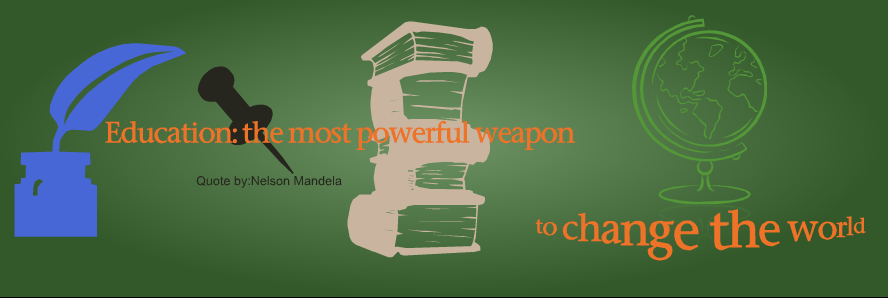National Issues
Education, the most powerful world changing weapon!

Education is in all paths present. There it hovers. Its dot beautifully etched in the sands of time.
Changing the world via education does not mean the creation of a utopian society (1); even so, technological capacity typically characterizes the rise of a new world power (2). The people with the dark melanin can get off the razor’s edge by properly wielding the scepter of education; employing steady investments in education to rise the steps of socioeconomic development, with education being the catalyst of a better future for the world (3).
Saying education is a weapon seems offbeat coming from Nelson Mandela– a peace legend, but the power of education is obvious. Education – the powerful non-violent weapon helps people, and societies break free from historic oppressions. The Arab spring revealed citizens whose minds open to the marvels of democracy, through education overturned the smiling burden of suffering borne by the society. Du Bois in “The souls of black folk” tells us “[The] South believed an educated Negro to be a dangerous Negro. And the South was not wholly wrong, for education among all kinds of men has had, and always will have, an element of danger and revolution, of dissatisfaction and discontent.” (4).
During the Nigerian-Biafra Civil war, the Biafra’s Science Group indigenous exploit in military equipment points that the Nigerian scientist and engineer can transform the country with the weapon of technological education, if properly motivated to do so (5).
Emile Durkheim claimed that education could transform the society, only if society wields it as a tool; he argued that, “education is only the mirror image of society”. It imitates and reproduces the latter (6). A society governed by leaders who neglect the educational development of its public, always lags behind. Recalling, Dr Ezekiel Izuogu, an electrical/electronics engineer-who in 1997 made prototypes of the first ever all-African car named Z-600 (the all-African dream machine)- it would have been the cheapest car in the world, but the National Automotive Council[i] never looked his way-the dream died in 2006 (7).
Education engages formal, non-formal, and informal education; builds civil capacity for an adaptable workforce, and a good quality of life (9).
Education has the ability to reduce the effects of, or possibly eradicate poverty. It has the power to create and improve economic status for individuals. However, barriers still lie in the way of global education disregarding the Millennium Development Goals[ii].
Lest, we forget like every weapon, man may wrongly employ education – to kill somebody, to steal or for terrorism- in order to cause violence to society and disrespect to authority. In countries where education is underdeveloped, the reality is low standards of living and high rates of violence. It will take advocacy and the understanding of social responsibility for education to break these barriers (8).
With careful examinations of how the civilizations of man have evolved, we see education and its forms in action, whether it is spiritual, physical, social, mental or technological; indispensable it is to our world.
References
1. Dike, Victor. The state of education in Nigeria and the health of the nation. Africa Economic Analysis. [Online] January 23, 2008. http://www.africaeconomicanalysis.org/articles/gen/education10204234737htm.html.
2. Joseph, Akinbola Mobolaji. WHERE ARE THE BLACK TOYS? Facebook. [Online] June 14, 2013. http://www.facebook.com.
3. Bokova, Irina. Resources for Speakers on Global Issues;Education for All. United Nations. [Online] https://www.un.org/en/globalissues/briefingpapers/efa/quotes.shtml.
4. Can education change society? Du Bois, Woodson and the politics of social transformation. Apple, Micheal. W. 1, February 25, 2013, Review of Education, Vol. 1, pp. 32-56.
5. Eugene, Arene. Nigeria/Biafra Civil War;Satirizes the Nigeria Civil War and its Aftermath from 1967 to 2007. [Online] May 2008. http://eugenearene.blogspot.com/ Nigeria/Biafra Civil War Satirizes the Nigeria Civil War and its Aftermath from 1967 to 2007.
6. Singer, A and Pezone, M. Education for social change: From theory to practice. 2003. Workplace: A Journal for Academic Labor, Vol. 5.
7. Editorial. The Death of the Nigerian Car. Vanguard. [Online] June 26, 2013. http://www.vanguardngr.com/2013/06/death-of-the-nigerian-car/.
8. Brandt, Samantha and RN, Karey D. McCullough. Positive Change through Educational Solutions. The Special Issue on Behavioral and Social Science. [Online] 2011. http://www.ijhssnet.com/journals/Vol._1_No._7_%5BSpecial_Issue_June_2011%5D/26.pdf.
9. UNESCO. Education for Sustainable Development. [Online] http://www.unesco.org/new/en/education/themes/leading-the-international-agenda/education-for-sustainable-development/education-for-sustainable-development/.
Abbreviations
[i] (NAC)
[ii] (MDGs)
Do you want to site this essay from the original source?
“Somefun, O. A.(2013). Education is the most powerful weapon, which you can use to change the world. [ONLINE] Available at: http://oluwasegun27.wordpress.com/2013/09/23/education-is-the-most-powerful-weapon-which-you-can-use-to-change-the-world/ ”



















